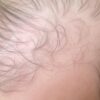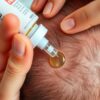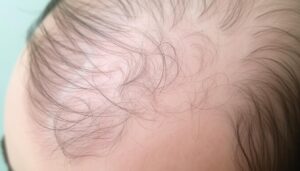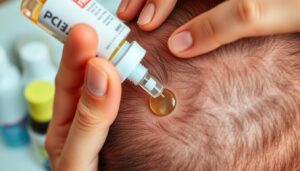Prednisone, a widely prescribed corticosteroid medication, has been a topic of concern for many individuals, particularly when it comes to its potential impact on hair health. As a patient or caregiver, it’s essential to understand the relationship between prednisone and hair loss, as well as the various factors that may contribute to this side effect. This article aims to provide you with the facts and insights you need to navigate the complexities of prednisone-related hair loss.
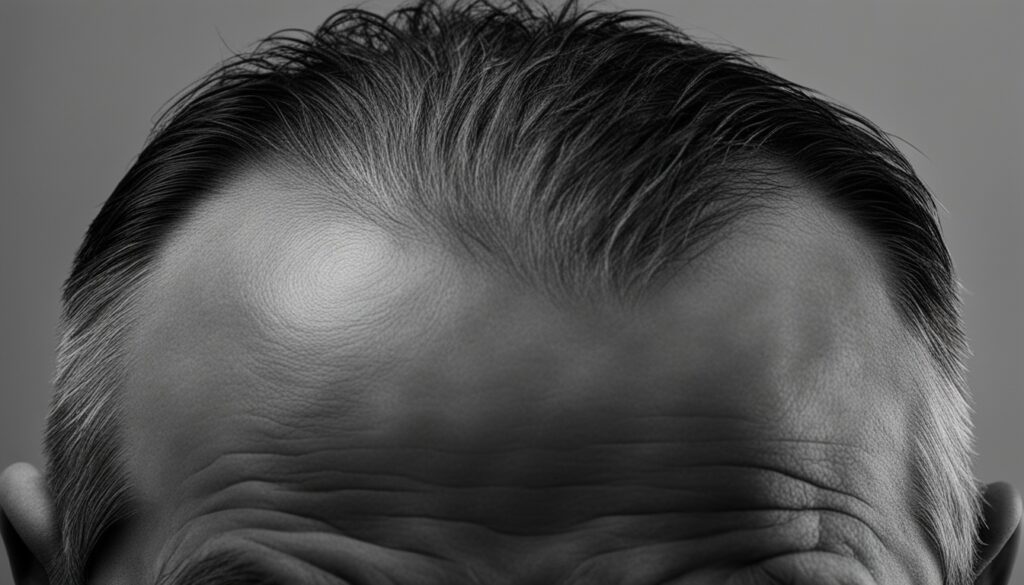
Key Takeaways
- Prednisone, a common corticosteroid medication, can potentially cause hair loss in some individuals.
- The risk and severity of prednisone-induced hair loss are influenced by factors such as dosage, duration of treatment, and individual sensitivity.
- Hair loss related to prednisone is typically reversible, and there are strategies to manage and reduce the impact on hair health.
- Prednisone can affect the texture and quality of hair, leading to changes in hair appearance and growth patterns.
- Understanding the myths and facts surrounding prednisone and hair loss is crucial for managing expectations and seeking appropriate medical guidance.
Understanding Prednisone and Its Side Effects
Prednisone is a widely prescribed corticosteroid medication used to treat various medical conditions, from autoimmune disorders to allergies. While this powerful drug can provide relief, it is important to understand its potential side effects, including the impact it may have on hair texture and growth.
What Is Prednisone?
Prednisone is a synthetic glucocorticoid that mimics the effects of the natural hormone cortisol. It is primarily used to reduce inflammation, suppress the immune system, and alleviate symptoms associated with a wide range of conditions, such as does prednisone affect hair texture, prednisone cause hair loss, does prednisone make your hair fall out, and can prednisone make your hair fall out.
Common Side Effects of Prednisone
While prednisone is an effective medication, it can also cause a variety of side effects, including:
- Weight gain
- Mood changes
- Increased blood sugar levels
- Bone loss
- Increased risk of infection
- Potential impact on hair texture and growth
It is crucial for patients taking prednisone to be aware of these side effects and to work closely with their healthcare providers to manage them effectively.
Understanding the nature of prednisone and its potential side effects is the first step in addressing any concerns related to hair health during treatment. By being informed, patients can take proactive measures to mitigate any unwanted effects and maintain their overall well-being.
Does Prednisone Cause Hair Loss?
One of the primary concerns patients have when prescribed prednisone, a widely-used corticosteroid, is whether it can lead to hair loss. The connection between prednisone and does prednisone cause hair loss has been a subject of ongoing research and discussion.
While the scientific evidence suggests that prednisone can indeed contribute to prednisone hair loss in some individuals, the extent and duration of this side effect can vary significantly. Several factors play a role in determining the likelihood and severity of hair loss during prednisone treatment.
Potential Mechanisms of Prednisone-Induced Hair Loss
Prednisone, a synthetic version of the natural hormone cortisol, can disrupt the normal growth cycle of hair follicles. This disruption can lead to a condition known as telogen effluvium, where a large number of hair follicles are pushed into the resting (telogen) phase, resulting in excessive shedding and thinning of the hair.
Additionally, prednisone can cause changes in the body’s immune system, which can indirectly contribute to hair loss in some individuals. In rare cases, prednisone may also trigger an autoimmune reaction that directly attacks the hair follicles, leading to a more severe form of hair loss known as alopecia areata.
| Mechanism | Explanation |
|---|---|
| Telogen Effluvium | Prednisone disrupts the normal hair growth cycle, leading to increased shedding and thinning of the hair. |
| Immune System Changes | Prednisone can alter the body’s immune response, which can indirectly contribute to hair loss in some individuals. |
| Autoimmune Reaction | In rare cases, prednisone may trigger an autoimmune reaction that directly attacks the hair follicles, leading to a more severe form of hair loss known as alopecia areata. |
It’s important to note that not everyone who takes prednisone will experience hair loss, and the severity of the issue can vary from person to person. Understanding the potential mechanisms and factors contributing to prednisone-related hair loss can help patients and healthcare providers better manage this side effect during treatment.
Factors Contributing to Prednisone-Related Hair Loss
When it comes to prednisone-induced hair loss, several factors can play a significant role in determining the likelihood and severity of this side effect. Understanding these contributing elements is crucial for individuals undergoing prednisone treatment to manage their expectations and potentially mitigate the impact on their hair.
Dosage and Duration of Treatment
One of the primary factors influencing prednisone-related hair loss is the dosage and duration of the treatment. Generally, higher doses of prednisone and longer treatment periods are associated with a higher risk of hair shedding. Patients on prolonged high-dose prednisone regimens are more likely to experience noticeable hair loss compared to those on lower doses or shorter treatment durations.
Individual Sensitivity to Prednisone
Beyond the dosage and duration factors, individual sensitivity to prednisone can also contribute to the degree of hair loss experienced. Some people may be more susceptible to the effects of prednisone on their hair follicles, leading to more pronounced shedding or thinning. This individual variation is influenced by factors such as genetics, overall health, and hormonal balance.
It’s important to note that not everyone who takes prednisone will experience is prednisone hair loss permanent or significant hair loss after prednisone. The severity and persistence of the hair loss can vary greatly from person to person, emphasizing the need for close monitoring and communication with healthcare professionals during the treatment process.
| Factors | Impact on Hair Loss |
|---|---|
| Dosage of Prednisone | Higher doses are associated with increased risk of hair loss |
| Duration of Treatment | Longer treatment periods increase the likelihood of noticeable hair shedding |
| Individual Sensitivity | Some individuals may be more susceptible to prednisone-induced hair loss due to genetic, health, or hormonal factors |
Prednisone Hair Loss in Females
When it comes to the impact of prednisone on hair loss, females may face some unique considerations. While prednisone can cause hair shedding in both men and women, the effects can be more pronounced in female patients due to hormonal factors and potential gender-specific sensitivities.
Prednisone, a corticosteroid medication, can disrupt the natural hair growth cycle, leading to excessive hair loss or thinning. This phenomenon, known as telogen effluvium, is a common side effect of prednisone that affects both sexes. However, the degree of hair loss can vary depending on the individual’s response to the medication.
Females, in particular, may be more susceptible to prednisone-induced hair loss due to the drug’s potential impact on the delicate hormonal balance. Prednisone can alter the production of hormones like estrogen and testosterone, which play a critical role in maintaining healthy hair growth. This hormonal disruption can exacerbate hair shedding and make it more challenging for female patients to regain their luscious locks.
Moreover, the severity of prednisone-related hair loss in females can be influenced by factors such as dosage, duration of treatment, and individual sensitivity. Higher doses or prolonged use of prednisone may increase the risk of more significant hair loss, while some women may be more sensitive to the drug’s effects on their hair than others.
It’s important for female patients taking prednisone to be aware of the potential for hair loss and to work closely with their healthcare providers to monitor and address any concerns. Early intervention and proactive management strategies can help minimize the impact of prednisone on hair health and potentially support the regrowth process.
How to Stop Hair Loss After Prednisone
If you’ve experienced hair loss while taking prednisone, there are steps you can take to mitigate and potentially stop this troubling side effect. The key is to work closely with your healthcare provider to manage your treatment and incorporate hair-friendly lifestyle changes.
Reducing the Dosage Gradually
One of the most effective ways to stop hair loss after prednisone is to gradually reduce the dosage under the guidance of your doctor. Sudden discontinuation of the medication can actually exacerbate hair shedding, so a slow, tapered approach is essential. Your healthcare provider can work with you to develop a safe and effective dosage reduction plan that minimizes the impact on your hair.
Incorporating Hair-Friendly Lifestyle Changes
In addition to dosage reduction, making some lifestyle adjustments can help support healthy hair growth after prednisone treatment. Consider the following strategies:
- Adopt a nutrient-rich diet that includes essential vitamins and minerals for hair health, such as biotin, iron, and zinc.
- Incorporate gentle, regular scalp massages to promote blood flow and nourishment to the hair follicles.
- Avoid harsh hair treatments, such as frequent coloring, bleaching, or excessive heat styling, which can further stress the hair.
- Manage stress levels through relaxation techniques, as stress can exacerbate hair loss.
- Consider using topical, FDA-approved treatments like minoxidil to stimulate new hair growth.
By working closely with your healthcare provider and making some lifestyle adjustments, you can take proactive steps to stop hair loss and promote healthy hair regrowth after prednisone treatment.
Is Prednisone Hair Loss Permanent?
One of the primary concerns about prednisone-induced hair loss is whether it’s a permanent condition. The good news is that in most cases, the hair loss associated with prednisone use is not permanent. The hair typically regrows once the medication is discontinued or the dosage is reduced.
Understanding the Reversibility of Hair Loss
Prednisone, a corticosteroid medication, can cause a type of hair loss known as telogen effluvium. This condition occurs when the medication disrupts the normal hair growth cycle, causing more hair to enter the resting (telogen) phase and subsequently shed. However, this process is generally reversible, and the hair will typically start growing back once the prednisone treatment is completed or the dosage is lowered.
The reversibility of prednisone-induced hair loss is largely dependent on the dosage and duration of the treatment. Individuals who have been on higher doses of prednisone for an extended period are more likely to experience more significant and prolonged hair loss. In contrast, those who have been on lower doses or have had shorter treatment periods may see their hair regrow more quickly once the medication is reduced or stopped.
| Prednisone Dosage | Duration of Treatment | Reversibility of Hair Loss |
|---|---|---|
| Higher Doses | Longer Treatment Periods | More Significant and Prolonged Hair Loss |
| Lower Doses | Shorter Treatment Periods | Quicker Regrowth of Hair |
It’s important to note that while the hair loss associated with prednisone is typically reversible, the time it takes for the hair to regrow can vary from person to person. Some individuals may see their hair start to regrow within a few months of discontinuing or reducing the medication, while others may take several months or even up to a year for their hair to fully recover.
Prednisone and Hair Loss: Myths and Facts
When it comes to the relationship between prednisone and hair loss, there are many misconceptions and misunderstandings. It’s essential to separate the myths from the facts to better understand this complex issue. Let’s explore the truth behind prednisone’s impact on hair health.
Myth: Prednisone always causes hair loss. The reality is that not everyone who takes prednisone experiences hair loss. While it’s a potential side effect, the degree of hair loss can vary significantly among individuals, depending on factors like dosage, duration of treatment, and personal sensitivity.
Fact: Prednisone can disrupt the normal hair growth cycle. Prednisone is a corticosteroid that can interfere with the anagen (growth) phase of the hair follicle, leading to increased shedding or thinning of hair. However, this effect is often temporary and hair growth typically resumes once the treatment is completed.
- Prednisone-induced hair loss is more common in women than men.
- Certain individuals may be more prone to prednisone-related hair loss due to genetic predisposition or underlying medical conditions.
Myth: Prednisone hair loss is permanent. While prednisone can cause temporary hair loss, it’s important to note that the condition is often reversible. Once the medication is discontinued or the dosage is reduced, hair growth usually recovers, and the hair regains its normal texture and appearance.
“Prednisone-induced hair loss is a common, but manageable, side effect. With the right approach and support, most individuals can successfully navigate this challenge and maintain their hair health.”
By understanding the facts about prednisone and hair loss, individuals can make informed decisions and take proactive steps to address any hair-related concerns during their treatment. Consulting with a healthcare professional is essential to develop a personalized plan for managing hair loss and maintaining overall well-being.
Treatment Options for Prednisone Hair Loss
If you are experiencing prednisone hair loss, there are several treatment options that you can consider:
You can use DHT-blocking shampoos in order to stop the production of DHT in the body. These treatments are preferred by people who are experiencing mild hair loss as a result of taking prednisone.
You can have scalp micropigmentation performed by an expert technician. Scalp micropigmentation is the only hair loss treatment option that offers guaranteed results. During this procedure, a technician will inject pigment into your scalp in order to create the appearance of a new hair follicle, adding density to your hair and redefining your hair line.
Partner with the Leading Scalp Micropigmentation Provider Today
Scalp micropigmentation is one of the most reliable treatment options for prednisone hair loss. This non-surgical treatment option also can be used to treat any form of hair loss, regardless of the root cause of the condition or its severity. For more information about scalp micropigmentation and to find out if you are a qualified candidate for this procedure, contact Scalpmasters today to set up a consultation appointment.



